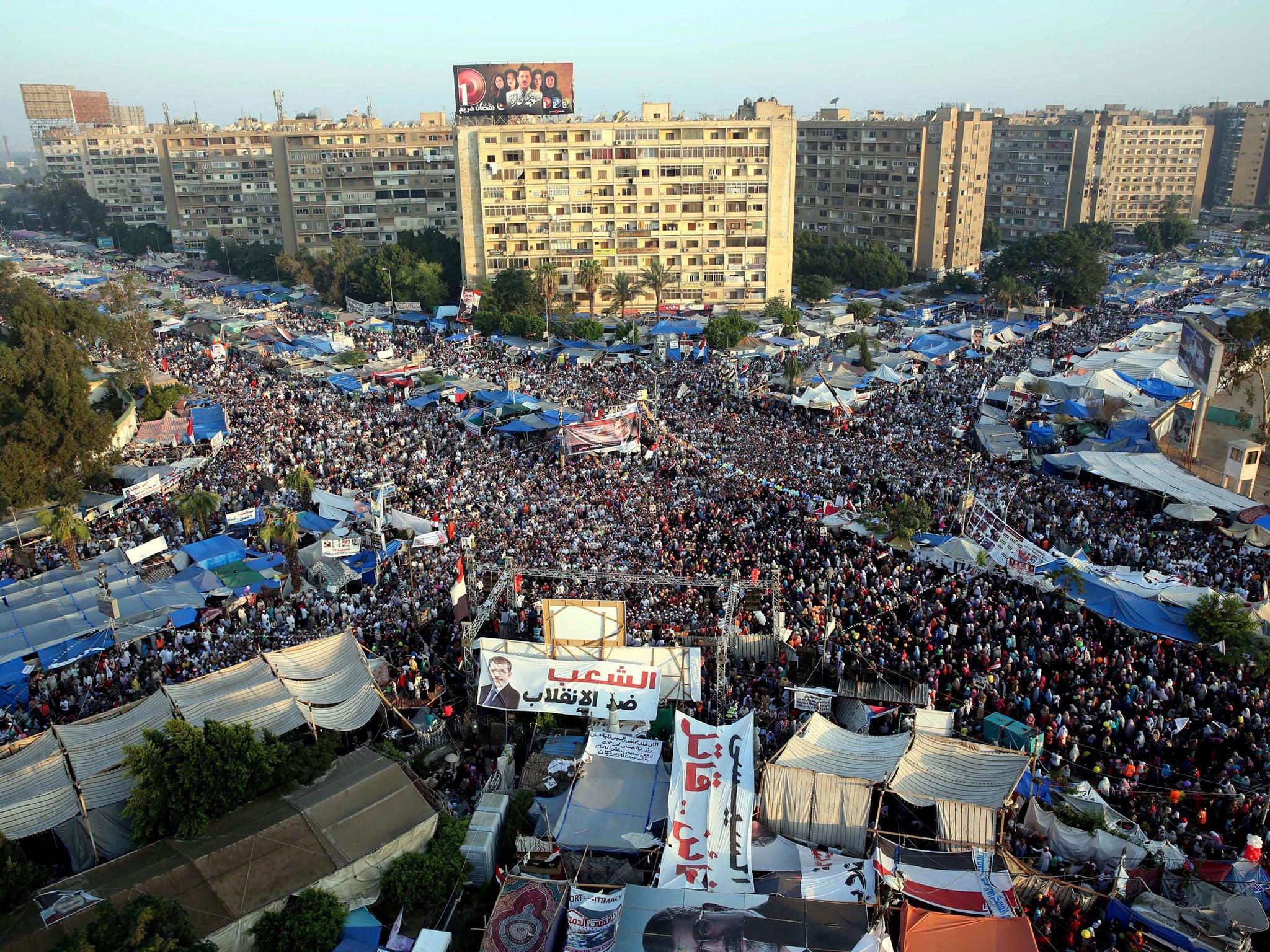'We are prepared to die' – life in Cairo’s Islamist tent city
Muslim Brotherhood supporters refuse to leave protest camps despite threats

On a long, straight stretch of Nasr Road, the 12-lane highway leading towards the Islamist tent city in eastern Cairo, the streets are still stained with the blood of dozens of Islamist protesters.
Many of them perished during the massacre carried out by Egypt’s security forces last month. Like other areas of Cairo, their memories are kept alive by those who have grown more determined through death.
“We are prepared to die for our cause,” said 31-year-old Ahmed Sharkawy as he stood next to one of the dozens of makeshift memorials which now dot the asphalt along the highway. “We won’t leave the sit-in. If they come to clear us out using tanks, we will lie beneath the wheels.”
For the past six weeks, supporters of deposed President Mohamed Morsi have been camped out in their massive tent cities on the streets of the Egyptian capital. They continue to demand the return of their ousted leader – something which has been rejected outright by their political opponents.
Following weekend reports that the security services were preparing to launch an operation to clear the sit-ins, speculation was rife that a crackdown may be imminent.
By yesterday evening, the expected operation – which has been hinted at by anonymous security sources quoted by the local press and international news organisations – had still not begun.
But many of the demonstrators who remain camped out yesterday appeared increasingly defiant when they spoke to The Independent.
“The army are traitors,” said Said Hanif, a 48-year-old engineer, as he made his way to the east Cairo encampment with his wife.
In reference to the belief among pro-Morsi supporters that last month’s popular coup represented an illegitimate power grab by the military, he said that Egypt “belongs to the people, it doesn’t belong to the army”.
The pro-Morsi sit-ins have become a nasty thorn in the side of Egypt’s political powerbrokers.
In the east Cairo suburb of Nasr City – where the largest of the two main protest sites has sprung up – an enormous encampment sprawls for half a mile in all directions from a crossroads near the Rabaa al-Adawiya mosque. Moreover, despite its appearance of a unified, homogenous whole, varying threads of Islamist allegiance have taken root. The Muslim Brotherhood may form the most influential block, but other groups have staked a claim. The fundamentalist Al-Asala Party has its own tent headquarters, as does Gamaa Islamiya, the group which once waged a campaign of terror against the Egyptian state.
It poses a tricky quandary for Egypt’s rulers. Either they can allow the country’s refusenik Islamists to continue their sit-in, or they can break it up by force. The first option, while less confrontational, would leave a looming, ever-present shadow lingering over the whole transition process.
But the second option could result in hundreds of deaths and a chain of dangerously unpredictable consequences.
Speaking to the BBC yesterday, Foreign Minister Nabil Fahmy said that efforts were being made to resolve the current impasse through negotiations. Yet he hinted that the government’s patience was wearing thin.
“It is not reasonable for any democratic government to have to accept sit-ins where violence is being used and the security of citizens and the country is being threatened,” he said.
A detailed report in the privately-owned Al Shorouk newspaper last week suggested that the authorities were intending to “kettle” the Nasr City protest – surrounding the sit-in and attempting to apply pressure by cutting water and electricity supplies.
Speaking to Reuters yesterday, a security official said protesters would be removed gradually. Tear gas and water cannons would be deployed if they failed to respond, he added.
But given the determination of many protesters, it seems unlikely that anything other than a full-scale clearance operation by hundreds of police or troops would have any affect.
“Asking us to leave is not a prospect that is grounded in reality,” said Mohamed Mahmoud, a member of Gamaa Islamiya. “If I am killed, I am sure I will become a martyr. In this case I will go to heaven.”
Subscribe to Independent Premium to bookmark this article
Want to bookmark your favourite articles and stories to read or reference later? Start your Independent Premium subscription today.

Join our commenting forum
Join thought-provoking conversations, follow other Independent readers and see their replies